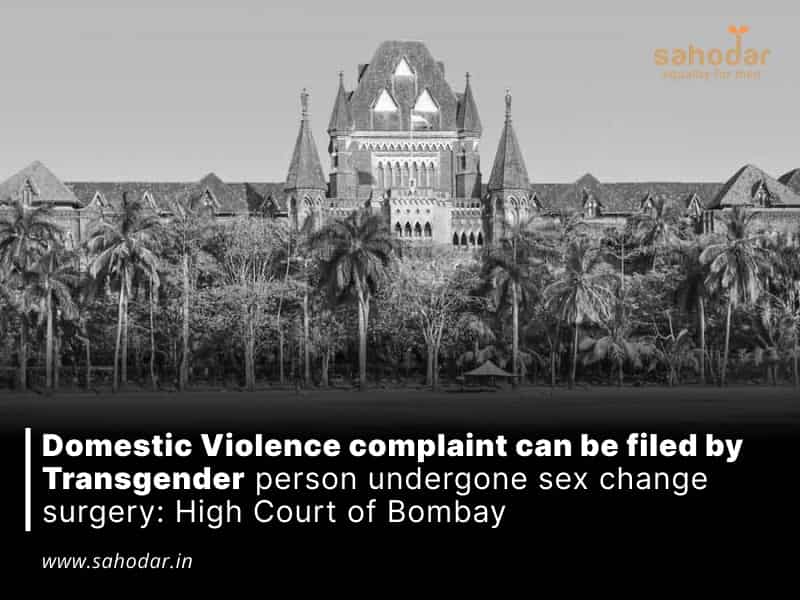The Bombay High Court has recently ruled that a transgender woman who has undergone sex reassignment surgery has the right to seek interim maintenance in a domestic violence case under the Domestic Violence Act, and can be considered an “aggrieved person”. A man had challenged the maintenance awarded to his wife, a trans woman, but Justice Amit Borkar dismissed the petition, stating that a transgender individual who has undergone surgery to change their gender to female should be regarded as an “aggrieved person” as per Section 2(a) of the Domestic Violence Act, 2005. The court held that such a person has the right to decide their self-identified gender and is entitled to the protections under the Act.
The court emphasized that the primary aim of the Protection of Women from Domestic Violence Act, 2005 is to safeguard women from any kind of violence within the family. In this context, the term ‘aggrieved person’ under Section 2(a) of the Act must be given a broad interpretation. The court stated that the definition of ‘aggrieved person’ should be interpreted in the broadest possible terms to align with the objective and purpose of the Act, which is to provide more effective protection to women who are victims of domestic violence.
The petitioner in this case had married the respondent, who is a transgender woman and had undergone sex reassignment surgery, in 2016. The respondent had filed a case under the Domestic Violence Act and had sought interim maintenance. The Judicial Magistrate First Class had granted her maintenance, and the Additional Sessions Judge had upheld it on appeal. The petitioner had then approached the High Court.
The petitioner argued that the respondent did not qualify as an ‘aggrieved person’ under the definition provided in the DV Act, as it only includes women who are in a domestic relationship. Additionally, he claimed that the respondent did not possess a certificate under Section 7 of the Transgender Persons (Protection of Rights) Act, 2019 and hence could not be treated as a woman under the DV Act.
In response to the petitioner’s argument, the respondent contended that the Supreme Court has already recognized the right of a transgender person to be granted recognition of their gender identity based on their reassigned sex. Therefore, a transgender woman who has undergone sex reassignment surgery should also be considered an “aggrieved person” under Section 2(a) of the Domestic Violence Act.
The central issue before the court was whether a transgender woman who has undergone sex reassignment surgery can be deemed an “aggrieved person” under the provisions of the Domestic Violence Act.
The court observed that Section 2(f) of the Domestic Violence Act, which defines a domestic relationship, is gender-neutral. Additionally, the court noted that the Transgender Persons (Protection of Rights) Act, under Section 2(k), defines transgender persons regardless of whether they have undergone sex reassignment surgery. Section 7 of the same Act enables a transgender person who has undergone the surgery to file an application before a magistrate to change their gender.
The court held that while the word “woman” is used in Section 2(a) of the Domestic Violence Act, it should not be used to narrow the scope of the Act. The court referred to the judgment in National Legal Services Authority v. Union of India, which held that transgender persons who have undergone sex reassignment surgery are entitled to choose their gender identity. Therefore, a transgender woman who has undergone sex reassignment surgery is entitled to be considered an “aggrieved person” under Section 2(a) of the Domestic Violence Act.
The court held that the primary objective of the Domestic Violence Act is to provide effective protection to women who are victims of domestic violence. Therefore, the definition of “aggrieved person” under Section 2(a) of the Act needs to be interpreted in the broadest possible terms.
The court further stated that the term “woman” in Section 2(a) of the Domestic Violence Act is not limited to the binary classification of men and women, but also includes transgender persons who have undergone sex reassignment surgery. The court emphasized that a person’s self-identified gender should be recognized, and they should be entitled to protection under the Domestic Violence Act irrespective of their biological sex assigned at birth.
Source: https://www.livelaw.in/top-stories/bombay-high-court-transgender-woman-sex-reassignment-surgery-domestic-violence-act-aggrieved-person-225279

